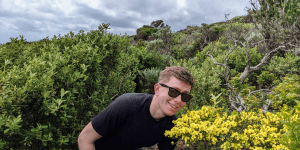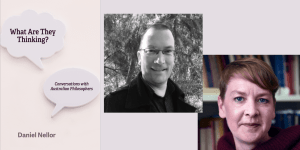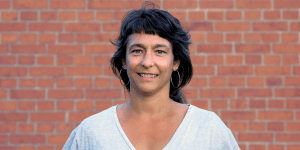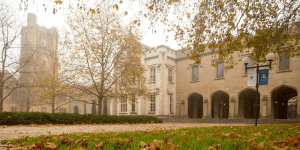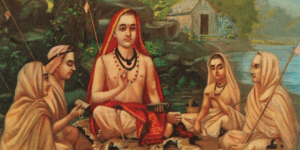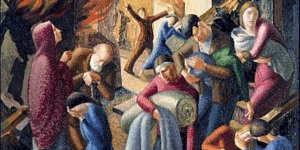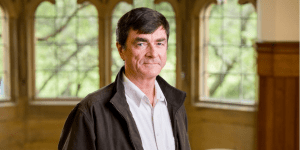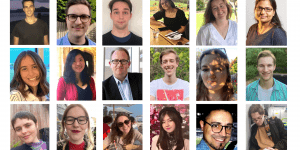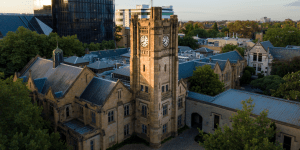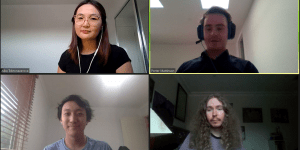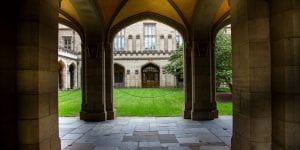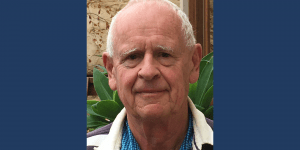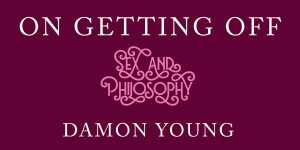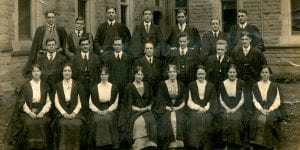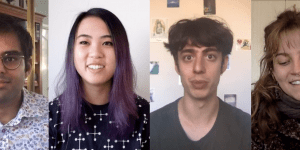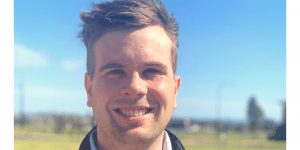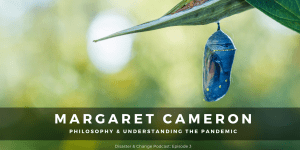Category: Philosophy
-
Introducing Dr Jenny Judge, Lecturer in Philosophy of Mind and Cognitive Science
In 2023 we were thrilled to welcome Dr Jenny Judge as newly appointed Lecturer in Philosophy of Mind and Cognitive Science. Dr Judge holds a PhD in Philosophy from New York University, as well as a PhD in Music from the University of Cambridge, where she was the recipient of a Fulbright Student Award. Sitting […] -
Are our thoughts ‘real’? Here’s what philosophy says
Associate Professor Sam Baron (Philosophy) reflects on philosophical debates over what thoughts are, in this piece republished from the Conversation. You can doubt just about anything. But there’s one thing you can know for sure: you are having thoughts right now. This idea came to characterise the philosophical thinking of 17th century philosopher René Descartes. For […]blogs.unimelb.edu.au/shaps-research/2025/03/11/are-our-thoughts-real-heres-what-philosophy-says
-
Silver Medal for Philosophy Students in Tertiary Ethics Olympiad
In October 2024 two teams of students from the University of Melbourne participated in the Australian Association for Professional and Applied Ethics (AAPAE) Tertiary Ethics Olympiad. These ethics athletes, or ‘eth-letes’, as they are known in the competition, went up against universities from across Australia. They were supported by coach Dr Alex Cain (Teaching Associate, Philosophy), who reports here […] -
Artem Bourov
Artem Bourov (MA in Philosophy, 2024), Be a Body: From Experiential Self-Awareness to a Truly Bodily Self -
Henry Dobson
Henry Dobson (PhD in Philosophy, 2024), A Common Morality Approach for AI Ethicsblogs.unimelb.edu.au/shaps-research/2024/05/14/henry-dobson-2
-
James Field
James Field (PhD in Political Theory and Philosophy, 2024), Democratic Constitutions, Disobedient Citizens: Conflict and Culture in Habermas’ Political Theory -
Nicole Nomikos
Nicole Nomikos (MA in Philosophy, 2024), Being and Knowing in Plato and Leibnizblogs.unimelb.edu.au/shaps-research/2024/05/07/nicole-nomikos
-
Philosophy Students Compete in Tertiary Ethics Olympiad
In October 2023 two teams of students from the University of Melbourne participated in the inaugural Australian Association for Professional and Applied Ethics (AAPAE) Tertiary Ethics Olympiad. These ethics athletes or ‘eth-letes’, as they are known in the competition, went up against universities from across Australasia. They were supported by coach Dr Alex Cain (Teaching Associate, Philosophy), […] -
William Ridge
William Ridge (PhD in Philosophy, 2024), On the Evolution, Ontology, and Design of Retail Central Bank Digital Currenciesblogs.unimelb.edu.au/shaps-research/2024/02/12/william-ridge
-
Ali Shammary
Ali Shammary (PhD in Philosophy, 2024), Absolute Poverty and Human Rights: An Examination of Factual and Normative Issues surrounding Absolute World Poverty -
Conversations with Australian Philosophers
Daniel Nellor’s book, What Are They Thinking? Conversations with Australian Philosophers (Australian Scholarly Publishing, 2023), features interviews with ten philosophers working in Australian universities today, including SHAPS philosophers Margaret Cameron, Chris Cordner and Dan Halliday. They discuss the nature of philosophy and why it’s valuable, and think through some of the big questions on their […]blogs.unimelb.edu.au/shaps-research/2023/11/30/conversations-with-australian-philosophers
-
Pascale Bastien
Pascale Bastien (PhD in Philosophy, 2023), Economic Growth, Liberalism, and the Good: A Contemporary Eudaimonistic Evaluation The majority of states worldwide pursue economic growth as a policy objective, and this tends to be justified in liberal and welfarist terms. However, the legitimacy of this pursuit is rarely debated and appears to be largely taken for […]blogs.unimelb.edu.au/shaps-research/2023/11/28/pascale-bastien
-
We Need Good Policy to Back Working Dads
How do men feel when they become fathers? Associate Professor Daniel Halliday (Philosophy) and Professor Cordelia Fine (HPS), together with Dr Melissa Wheeler (Swinburne Business School) spoke to a handful of Australian dads who generously agreed to share their experiences on the new Working Fathers podcast – many spoke of deep emotional responses. “Probably the most […]blogs.unimelb.edu.au/shaps-research/2023/07/17/we-need-good-policy-to-back-working-dads
-
Leonard D’Cruz
Leonard D’Cruz (PhD in Philosophy, 2023) ‘Foucault and Normative Political Philosophy’ This thesis brings Michel Foucault’s work into dialogue with the tradition of normative political philosophy inaugurated by John Rawls. More specifically, it draws on Foucault’s ideas to develop an original approach to normative theorising that emphasises the importance of situated insights in reconstructing our […]blogs.unimelb.edu.au/shaps-research/2023/03/19/leonard-dcruz
-
Alastair James
Alastair James (PhD in Philosophy, 2023), ‘Labour Market Justice: Old and New Problems’ This thesis sets out to analyse normatively significant and in some cases under-theorised labour market phenomena to identify forms of injustice and provide philosophically defensible responses that take seriously the feasibility constraints governing policy proposals. Some chapters engage with longer-standing questions, such […]blogs.unimelb.edu.au/shaps-research/2023/02/07/alastair-james
-
Caroline James-Garrod
Caroline James-Garrod (PhD in Philosophy, 2023) ‘Pressed for Time: A Study of Digital Journalists’ Ethical and Temporal Conundrums’ This thesis argues digital print journalists experience social and time ethics pressures due to constant responsibilities to stay connected to mobile work-related online communications. It claims this identifies a social phenomenon – cyber time poverty. It examines […]blogs.unimelb.edu.au/shaps-research/2023/02/06/caroline-james-garrod
-
Ajay Raina
Ajay Raina (PhD in Philosophy, 2023), A Critique of Differentiated Citizenship This thesis is a critique of ‘liberal’ theories of culturally differentiated citizenship, with primary focus on Will Kymlicka’s philosophy. The main proposition of differentiated citizenship is that, for reasons of (distributive) justice, liberal states ought to give special rights to cultural minorities in addition […] -
The (Call-)Ins and (Call-)Outs of Norm-Enacting Speech
In 2020 Kelly Herbison was the recipient of a Hastie Scholarship, awarded annually to the highest achieving students in Honours Philosophy. In this article, Kelly shares some of the findings from her Honours thesis project, which used the philosophy of language and social norms to examine the practices of ‘calling-out’ and ‘calling-in’ as methods for […]blogs.unimelb.edu.au/shaps-research/2022/12/12/call-ins-and-call-outs
-
Introducing Dr Tristan Grøtvedt Haze
Tristan Grøtvedt Haze joined the University of Melbourne in 2022 as a Lecturer (Teaching Specialist) in Philosophy. His first book, Meaning and Metaphysical Necessity, was recently published by Routledge. Tristan specialises in metaphysics and logic, and teaches across a number of undergraduate Philosophy subjects. He also enjoys some rather funny extracurricular activities, which he explores […]blogs.unimelb.edu.au/shaps-research/2022/08/22/introducing-dr-tristan-grotvedt-haze
-
The SHAPS Hellenic Ball
This winter, SHAPS undergraduate student societies came together to embark on an ambitious and rewarding undertaking. Abigail Banister-Jones, Co-Consul/President of MUCLASS (Melbourne University Classics & Archaeology Student Society), reports on the inaugural SHAPS Ball below. Where else does one throw a ball for classics, history and philosophy students but the Hellenic Museum? Surrounded by artefacts […]blogs.unimelb.edu.au/shaps-research/2022/08/15/the-shaps-hellenic-ball
-
An Interview with Associate Professor Laura Schroeter
The School of Historical and Philosophical Studies congratulates Laura Schroeter on her recent promotion to Associate Professor. Specialising in Philosophy of Mind, Philosophy of Language, and Metaethics, Laura has gained international recognition for her work on two-dimensional (2D) semantics and is famed for her ‘jazz model’ of concepts. As long-serving director of postgraduate studies in […]blogs.unimelb.edu.au/shaps-research/2022/06/13/an-interview-with-associate-professor-laura-schroeter
-
David Liknaitzky
David Liknaitzky (PhD in Philosophy, 2022) ‘In Search of Just, Humanised Work: Overcoming Workplace Oppression and Rethinking Leadership to Create the Conditions for Human Flourishing at Work’ Organisations have evolved historically such that, in some instances, it has become the norm to treat employees in ways that would otherwise not be tolerated (or, at least, […]blogs.unimelb.edu.au/shaps-research/2022/04/28/david-liknaitzky
-
An Interview with Associate Professor François Schroeter
SHAPS congratulates François Schroeter from Philosophy on his recent promotion to Associate Professor. Originally from Switzerland, where he completed his PhD at the University of Fribourg, François joined the University of Melbourne in 2003. His academic work spans both Continental philosophy and Western analytic philosophy, with special interests in metaethics, moral psychology, Kantian ethics, and […] -
Exploring the History of Indian Philosophy
Purushottama Bilimoria (Principal Fellow in Philosophy) is co-editor (with Amy Rayner) of a major volume, History of Indian Philosophy. Covering three thousand years of Indian philosophy, with 58 contributors, the volume was published as part of the Routledge History of World Philosophies series in 2018 and recently re-issued in paperback. In this interview by Philosophy […]blogs.unimelb.edu.au/shaps-research/2022/02/14/exploring-the-history-of-indian-philosophy
-
Defining Political Terrorism
Emeritus Professor Tony Coady’s latest book, The Meaning of Terrorism (Oxford University Press, 2021), explores competing ways of thinking about political terrorism and its consequences. In this interview with Associate Professor Dan Halliday, Tony Coady explains how and why he came to write the book, and introduces the ongoing philosophical debates over how to define […]blogs.unimelb.edu.au/shaps-research/2022/01/17/the-meaning-of-terrorism
-
An Interview with Professor Howard Sankey
The School of Historical and Philosophical Studies is this year pleased to announce Howard Sankey’s promotion to full Professor. Since his arrival at the University of Melbourne in 1992, Howard’s research has remained at the forefront of epistemology and philosophy of science, his teaching engaging and reflective of his clear and ongoing enthusiasm. Howard’s interests […]blogs.unimelb.edu.au/shaps-research/2021/12/13/an-interview-with-professor-howard-sankey
-
Paul-George Arnaud
Paul-George Arnaud (PhD in Philosophy, 2021) ‘Philosophy and the Method of Cases: Three Interpretations’ The method of cases is an approach to philosophical theorising that involves the use of thought experiments to evoke intuitions for the purpose of evaluating philosophical claims and theories on the basis of their fit with these intuitions. Although there is […]blogs.unimelb.edu.au/shaps-research/2021/11/19/paul-george-arnaud
-
Celebrating Our Students’ Achievements
Looking back on last year’s note of congratulations to our student award recipients, I noted then the extraordinary (pandemic-driven) conditions during which the students were working. This year the point is doubly true and needs to be acknowledged explicitly. Most of the work that is being awarded by these prizes was done remotely, often independently, […]blogs.unimelb.edu.au/shaps-research/2021/11/15/shaps-student-prizes-scholarships-2020
-
Timo Eckhardt
Timo Eckhardt (PhD in Philosophy, 2021) ‘Extended Model Semantics and Forgetting in Dynamic Epistemic Logic‘ In this thesis I investigate the idea of modelling epistemic updates as static modal operators. I discuss Extended Model Semantics for Dynamic Epistemic Logics, specifically Action Model Logic with postconditions. I argue that we get a better and more versatile […]blogs.unimelb.edu.au/shaps-research/2021/11/14/timo-eckhardt
-
Sakinah Munday
Sakinah Nadiah Munday (MA in Philosophy, 2021) ‘Pragmatic Silencing: Against Intentionalism, and the Need for a Social Norm Account of Linguistic Disablement’ Philosophers have long theorised that we use our words not just to communicate ideas, but also to perform everyday actions known as ‘speech acts’. More recently, feminist philosophers have argued that speakers, particularly […]blogs.unimelb.edu.au/shaps-research/2021/11/05/sakinah-nadiah-munday
-
Melbourne University Philosophy Society 2020–2021
Despite rolling lockdowns, the SHAPS undergraduate societies have continued to operate and thrive, doing vital work in creating innovative ways for students to connect and interact throughout the pandemic. In this article, we feature the Melbourne University Philosophy Society (MUPS). We farewell the outgoing 2021 committee and look back on their activities over the past […]blogs.unimelb.edu.au/shaps-research/2021/11/03/shaps-undergrad-soceties-part-one
-
Josipa Mickova
Josipa Mickova (MA in Philosophy, 2021), ‘On the Relationship between the Infinite and Finite, and between Adequate and Inadequate Knowledge in Spinoza’s Philosophy‘ The relationship between substance and modes is an enduring problem in Spinoza studies. How this relationship is understood is consequential on all aspects of Spinoza’s tightly knit philosophical system. This thesis focuses […]blogs.unimelb.edu.au/shaps-research/2021/11/02/josipa-mickova
-
Paul-Mikhail Podosky
Paul-Mikhail Podosky, ‘Barriers to Change, Possibilities for Resistance: Concepts within Structures of Oppression, Obstacles to Innovation, and the Implementation Challenge of Conceptual Engineering’ (PhD, Philosophy, 2021) Conceptual engineering, when it comes to social kind concepts, has strong political roots within the academy and activist circles alike. But if conceptual engineering, understood as the development of […]blogs.unimelb.edu.au/shaps-research/2021/10/29/paul-mikhail-podosky
-
Alisha Rajaratnam
Alisha Rajaratnam (MA in Philosophy, 2021) ‘Disjunctivism, Perceptual Capacities and Our Point of View on the World‘ Negative Disjunctivism is a frequently misunderstood position. Disjunctivists of this stripe hold that all that can be said about the phenomenal character of a hallucination of an F is that it is introspectively indiscriminable from a veridical perception […]blogs.unimelb.edu.au/shaps-research/2021/10/27/alisha-rajaratnam
-
Antonia Smyth
Antonia Smyth (MA in Philosophy, 2021) ‘Epistemic Injustice in Cases of Compulsory Psychiatric Treatment‘ There is a growing body of philosophical research into epistemic injustice in the psychiatric context; this thesis examines the impact of this distinct form of injustice on people in compulsory psychiatric treatment specifically, that is, on people receiving treatment without their […]blogs.unimelb.edu.au/shaps-research/2021/10/19/antonia-smyth
-
Blake Peter Stove
Blake Peter Stove, ‘The Truth of Heidegger’s Existential Analytic of Dasein‘ (MA in Philosophy, 2021) Martin Heidegger’s Being and Time is an ambitious work that fuses transcendental-ontological and historical themes. Critics have argued that these two aspects of the work are inconsistent and, in light of Heidegger’s substantive claims regarding the historical structure of human […]blogs.unimelb.edu.au/shaps-research/2021/10/17/blake-peter-stove
-
William Tuckwell
William Tuckwell (PhD in Philosophy, 2021) ‘Non-ideal Epistemic Contextualism‘ Epistemic contextualists claim that in order for knowledge ascribing sentences, i.e., sentences of the form ‘S knows that p’, to be true S must meet different epistemic standards in different contexts. Some contextualists, those who I’ll label conversational contextualists, claim that speakers can change which standards […]blogs.unimelb.edu.au/shaps-research/2021/10/15/william-tuckwell
-
Reflecting on the Career and Work of Christopher Cordner
Associate Professor Christopher Cordner retires from teaching this year after more than three decades in Philosophy at the University of Melbourne. During this time his contribution to his students and the wider philosophical community has been immense, and his work in moral philosophy has been globally recognised. He will continue to be a valued part of […]blogs.unimelb.edu.au/shaps-research/2021/04/12/an-interview-with-christopher-cordner
-
Vale, Josie Winther
The staff of the School of Historical and Philosophical Studies mourn the passing of long-time colleague and former School Manager Josie Winther, who passed away in January 2021. Josie dedicated over 40 years to the University, starting out in the Faculty in her late teens. Josie started off as an admin assistant in the Department […]blogs.unimelb.edu.au/shaps-research/2021/02/18/vale-josie-winther
-
What Philosophy Can Tell Us About Sex and the Human Condition
Dr Damon Young is an associate in Philosophy, and the author of several acclaimed nonfiction books, including Philosophy in the Garden (MUP 2012) and The Art of Reading (MUP 2016). His most recent book is On Getting Off: Sex and Philosophy (Scribe 2020) which looks more closely at this most intimate (but often disparaged) part of […]blogs.unimelb.edu.au/shaps-research/2021/01/29/philosophers-on-sex
-
Applied Proof Theory: Holding an International Workshop during the Pandemic
How do you hold an international workshop at a time when travel between continents is at a standstill and countries all over the world are in lockdown? Greg Restall, Professor in Philosophy, explains how this worked at the recent international workshop on Applied Proof Theory. -
Feminism and the History of Democracy
The English historian Catharine Macaulay (1731–1791) was one of the leading radical thinkers of her time and, yet, she has been largely forgotten today. In this blog post, Karen Green, Honorary Professorial Fellow in Philosophy, and author of a number of works about Catharine Macaulay, makes the case for reintegrating her legacy into the history […]blogs.unimelb.edu.au/shaps-research/2020/11/02/feminism-and-the-history-of-democracy
-
The Early History of Philosophy at the University of Melbourne
Not long before lockdown began, a display case documenting episodes from the history of the University’s Philosophy program was mounted on Level Four of the North Wing of the Arts West building at our Parkville campus. Since it will be some time before we can return to campus physically, we’ve decided to bring this display […] -
Students Chat about Philosophy
We are social creatures and the current lockdown isolation is hard on all of us – whether extrovert or introvert. So we thought you might enjoy meeting some of our wonderful students. Philosophy is currently one of the fastest growing majors in the Arts Faculty. These self-made mini videos will give you a glimpse of […]blogs.unimelb.edu.au/shaps-research/2020/08/28/students-chat-about-philosophy
-
The Inaugural SHAPS Optimus Awards
In 2019 SHAPS Head of School Professor Margaret Cameron launched a new set of annual awards. Through the Optimus Awards, SHAPS will recognise and celebrate members of our community who exemplify one or more of the values articulated in the Faculty of Arts Strategy Map 2019–2025. All members of the School community, including undergraduate and […]blogs.unimelb.edu.au/shaps-research/2020/08/14/the-inaugural-shaps-optimus-awards
-
How to Keep Minorities Out of Philosophy
Academic philosophy faces numerous challenges in the current climate. One of its ongoing problems is the systemic barriers in place in the discipline for minority students. In this article, republished from Overland, SHAPS PhD Candidate Paul-Mikhail Catapang Podosky and recent Honours graduate Kelly Herbison explore some of these issues. As we gathered on our university’s […]blogs.unimelb.edu.au/shaps-research/2020/07/24/how-to-keep-minorities-out-of-philosophy
-
Martin Kovacic
Martin Kovacic, ‘The Buddhist Ethics of Killing: Metaphysics, Phenomenology, Ethics’ (PhD in Philosophy, 2020) Significant media interest and academic scholarship has in recent years brought attention to the normative status of killing in Buddhism, concurrent with the worst genocidal event since the last century, committed by apparent Buddhists, in Rakhine State in Myanmar, in August-September […]blogs.unimelb.edu.au/shaps-research/2020/06/03/martin-kovacic
-
Philip Patterson
Philip Patterson, ‘Virtue and the Three Monkey Defence: Regulating Ethical Conduct in the Australian Public Service’ (PhD in Philosophy, 2020) The thesis is an investigation of the efficacy of the ‘values-based’ ethics regulation system … operated by the Australian Public Service (‘APS’). Normative propositions which identify virtue, human character, or dispositions to behave, as determinatively […]blogs.unimelb.edu.au/shaps-research/2020/06/02/philip-patterson
-
Fergus Dale Prien
Fergus Dale Prien, ‘A Reliabilist Strategy for Solving the Problem of Induction’ (MA in Philosophy, 2020) In this thesis I develop a two-stage strategy in which a simple reliabilist theory of knowledge and justification can be employed so as to solve David Hume’s famous ‘problem of induction’. In so doing, the key arguments I make include: (i) […]blogs.unimelb.edu.au/shaps-research/2020/06/02/fergus-dale-prien
-
Episode 3 in the SHAPS Podcast Series: Professor Margaret Cameron
This episode of our podcast, Disaster & Change, is intended to help us think through our current situation during the global coronavirus pandemic. The focus is on understanding the phenomenon of change or, more specifically, how we understand the causes of change. This is a philosophical discussion, although it has been prepared in a way […]blogs.unimelb.edu.au/shaps-research/2020/05/21/disaster-change-3
Number of posts found: 76



